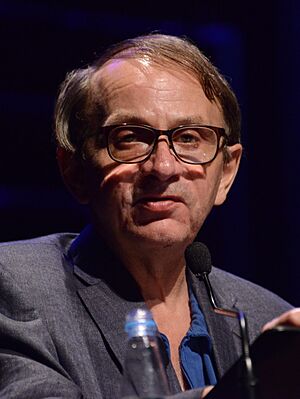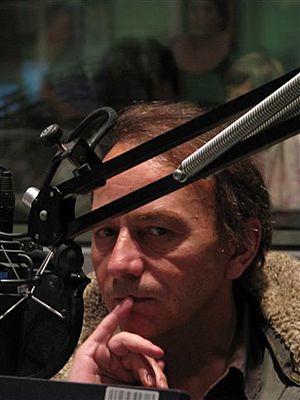Michel Houellebecq facts for kids
Quick facts for kids
Michel Houellebecq
|
|
|---|---|

Houellebecq in 2016
|
|
| Born | Michel Thomas 26 February 1956 Réunion, France |
| Occupation |
|
| Notable works |
|
| Notable awards |
|
| Spouse |
|
| Children | 1 |
Michel Houellebecq (born Michel Thomas on February 26, 1956) is a famous French writer. He is known for his novels, poems, and essays. He has also worked as an actor and filmmaker.
His books often make people think about modern life. They have earned him both praise and controversy. His first novel was Whatever, published in 1994. His 1998 novel, Atomised, made him famous around the world.
Houellebecq's work has led to public discussions. After his 2001 novel Platform was released, some of his comments about religion led to a court case. He was cleared of all charges. He later moved to Ireland for a few years before returning to France, where he lives now.
Many people consider him one of France's most important living writers. In 2010, he won the prestigious Prix Goncourt award for his novel The Map and the Territory.
Contents
Early Life and Education
Michel Houellebecq was born on the French island of Réunion. His parents were Lucie Ceccaldi, a doctor, and René Thomas, a ski instructor. He has said his birthday might be in 1958, but his official birth year is 1956.
He lived in Algeria for a short time as a baby. When he was six, he was sent to France. He lived with his paternal grandmother. He later took her last name, Houellebecq, as his pen name.
He went to high school in Meaux, a town near Paris. Later, he studied at the Institut National Agronomique Paris-Grignon, a top school for agricultural science. He graduated in 1980.
Writing Career
Houellebecq began his career by writing poetry. His first poems were published in a magazine in 1985. In 1991, he wrote a book about the horror writer H. P. Lovecraft, whom he admired as a teenager.
First Novels
His first novel, Extension du domaine de la lutte (published in English as Whatever), came out in 1994. The book is about a computer programmer who feels lonely and disconnected from the world.
His second novel, Les Particules Élémentaires (published in English as Atomised), was released in 1998. This book was a huge success. It made him famous but also caused a lot of debate. The story follows two half-brothers with very different lives. The book was praised for its bold ideas but also criticized for its dark view of the world. It won the International Dublin Literary Award in 2002.
Later Works
In 2001, Houellebecq published Plateforme (Platform). This novel was also a success. It tells the story of a man who works in the arts. The book explored controversial themes about tourism and modern relationships.
His 2005 novel, La Possibilité d'une île (The Possibility of an Island), tells a story across different time periods. It features a comedian and his future clones. The book explores ideas about science and what it means to be human.
In 2010, he released La Carte et le Territoire (The Map and the Territory). This novel is about an artist and the modern art world. It won the Prix Goncourt, one of France's most important literary awards.
His 2015 novel, Submission, imagines a future France where a new political party comes to power. The book sparked a lot of discussion when it was released.
Themes in His Work
A common theme in Houellebecq's novels is how modern life affects people. His books often explore feelings of loneliness and the search for happiness.
The French title of his first novel, Extension du domaine de la lutte, means "broadening the field of struggle." This idea suggests that competition in the economy has spread to personal relationships.
His work often looks critically at modern ideas and social changes. He is known for writing about difficult subjects in a direct and thought-provoking way.
Adaptations of His Work
Many of Houellebecq's books have been turned into movies and plays.
- Extension du domaine de la lutte was made into a French film in 1999. It was also adapted into a play in Denmark.
- Atomised was made into a German film called Elementarteilchen in 2006.
- The Possibility of an Island was adapted into a film in 2008, which Houellebecq directed himself.
- The American rock singer Iggy Pop released an album in 2009 called Préliminaires. He said it was inspired by The Possibility of an Island.
Selected Publications
- H. P. Lovecraft: Against the World, Against Life (1991)
- Whatever (1994)
- The Art of Struggle (1996)
- Atomised (1998)
- Platform (2001)
- The Possibility of an Island (2005)
- The Map and the Territory (2010)
- Submission (2015)
- Serotonin (2019)
- Annihilation (2022)
See also
 In Spanish: Michel Houellebecq para niños
In Spanish: Michel Houellebecq para niños
 | Dorothy Vaughan |
 | Charles Henry Turner |
 | Hildrus Poindexter |
 | Henry Cecil McBay |


